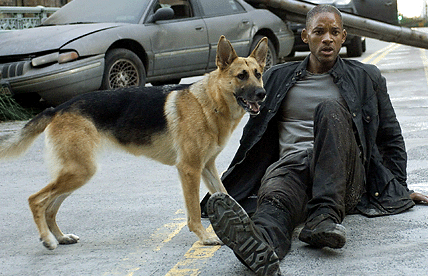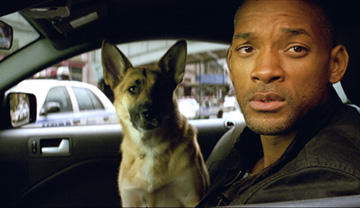
In Francis Lawrence’s I am Legend, Will Smith wanders the streets of New York City, his only companion his trusty, loyal, and free-spirited canine sidekick. To stave off the despair and dementia that lurks behind interminable loneliness, he dotes on his dog and immerses himself in routine: He watches as many movies as possible, indulges in his music collection, broadcasts his continued existence into the ether, and throws himself into his work, a solitary investigation marked by repetition and feelings of futility, one whose fruits he knows will more than likely go unused and unread. To all of this, I say: Who the hell wants to sit through a movie about the last year and change of grad school? And couldn’t they find a sheltie to play l’il Berk? (As for yours truly, I’d have gone Philip Seymour Hoffman or Paul Bettany — maybe Michael Cera for the flashbacks — but, hey, Will Smith works too.)
Seriously, though, when I first heard word they were doing another take on Richard Matheson’s eerie 1954 novella, and that word was penned by hackmeister Akiva Goldsman and read “We’re blowing up the Brooklyn Bridge!“, I figured this would be a big budget stinker, along the lines of Alex Proyas’ version of I, Robot. And yet, while a action blockbuster has been grafted onto the basic story (and it’s moved from suburban California to the heart of Metropolis), Francis Lawrence’s I am Legend is surprisingly true to the grim feel of the novella. In short, Legend is a much quieter and more melancholy film than I ever expected. And, while it definitely has some problems, it’s probably my favorite big budget blockbuster of the year, with the possible exception of The Bourne Ultimatum. True, Lawrence’s take on Constantine in 2005 turned out better than I figured as well. Still, I’m actually quite surprised by how moody and haunting this film turned out to be. (And, give credit where it’s due. Like Paul Haggis and In the Valley of Elah, I’m forced to concede that Goldsman might not always be the kiss of death.)
I am Legend begins innocuously enough with a sports report — It looks like the Yankees and Cubs in the World Series, although LA has an outside shot at a pennant too. But, in the near future, it ain’t just the ball players injecting experimental serums anymore. As a doctor (Emma Thompson) on the news informs us, scientists have altered the measles to work as the ultimate body-cleansing virus, in effect working as a cure for cancer. (A Cure for Cancer! This follows the baseball scores?) Cut to New York City, three years later. Round the decay of that colossal wreck, nothing beside remains…except one man (Will Smith) and his dog (Abbey), chasing down a herd of deer through the empty steel corridors of a desiccated Manhattan. (Sorta like Llewellyn Moss in No Country for Old Men, except now that country is everywhere, and the deermeat is worth more than the bag of money.) Clearly, something has gone Horribly Wrong. As we come to discover, that heralded cure backfired in dismal fashion, killing 90% of the Earth’s population immediately and turning the rest, a la the rage virus in 28 Days and 28 Weeks Later, into violent, depraved monsters with a taste for blood and a susceptibility to sunlight. This Last Man on Earth is one Robert Neville, an army scientist (blessedly immune to the disease) who spends his days in a Jamesian manse on Washington Square, working on a cure to beat back the infection, and his nights just trying to stay alive. (Put simply, “scientific atrocity, he’s the survivor.”) But, even with Samantha, his German shepherd, by his side, the loneliness and omnipresent danger are taking their toll. And as he succumbs deeper into hopelessness — and the creatures show signs of learning — his coping strategies begin to shift. Forget the cure…Maybe it’s time just to chase these Crazy Baldheads out of town…
Now, as I said, I am Legend does have it share of problems. The movie becomes more of a conventional actioner as it moves along, and the last act in particular feels weaker than the rest of the film. Looking exactly like the cave-dwellers in Neil Marshall’s The Descent, the CGI creatures have an ill-favored and badly-rendered look, and the more you see of them the less scary they become. Also, in complete counterpoint to what Dr. Neville tells us about the infecteds’ “social deevolution,” they eventually seem to get behind a Lurtz/Solomon Grundy of sorts. But his presence or authority is never really explained — he’s just a tacked-on Big Bad. I had trouble believing that somebody could’ve heard of Damien Marley but not his father Bob. (And, since you’re seemingly geared to the teeth, Dr. Neville, may I make some suggestions? 1) Infrared scope. 2) Night-Vision goggles.)
All that being said, for most of I am Legend‘s run it’s a surprisingly rich and nuanced film. Will Smith is invariably an appealing presence, but he doesn’t rely on his easy charisma or “Aw, hell no!” bluster much here. His performance is tinged with melancholy, and he does some great work in some really awful moments. Also, I feared going in that the canine companion bit would come across as a gimmick, just a cute creature for Smith to bounce off expository monologues. But Sam isn’t just Wilson the Volleyball — she’s a living, breathing character of her own. (Nor is she Lassie — she doesn’t seem preternaturally smart, and occasionally does dumb dog things, which seemed all too realistic.) And then there’s New York after the Fall, which in itself is a sort of character in the film. In shot after shot (somewhat akin to, but less showy than, the opening Times Square sequence of Vanilla Sky), Lawrence captures the eeriness of this great city laid low. Other than the aforementioned Brooklyn Bridge, “Ground Zero,” as Neville now calls it, hasn’t been destroyed or ravaged. It’s just empty, an overgrown, city-sized echo chamber for his pangs of isolation. (And as the Marley song goes, “It hurts to be alone.”) But, hey, even in a desolate New York City, with vampires lurking in the dark places, there are still plenty of fun ways to pass the time, and particularly if you have a good dog by your side.


